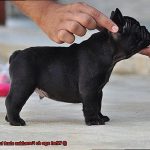What are the problems with inbred French Bulldogs?
Today, we’re peeling back the layers of the French Bulldog world – those irresistible, squishy-faced pups that have stolen hearts across the globe. But beneath their adorable façade lies a troubling reality – the problems that arise from inbreeding French Bulldogs.
Inbreeding, the controversial practice of breeding closely related individuals, has sparked concern within the canine community for years. In this post, we’ll delve into why this happens, unravel the health complications it can bring about, and uncover the long-term consequences for these cherished dogs.
So buckle up and get ready to explore this informative journey together as we shine a light on the unfortunate implications of breeding French Bulldogs within a limited gene pool. Let’s dive in and discover what lies beneath those irresistibly cute exteriors.
The Dangers of Brachycephalic Syndrome in French Bulldogs
Contents
- 1 The Dangers of Brachycephalic Syndrome in French Bulldogs
- 2 Allergies: A Common Issue for Inbred French Bulldogs
- 3 Eye Disorders in Inbred French Bulldogs
- 4 Musculoskeletal Issues in Inbred French Bulldogs
- 5 Skin Conditions and Inbred French Bulldogs
- 6 How to Minimize the Risk of Health Problems in French Bulldogs
- 7 Veterinary Care for Inbred French Bulldogs
- 8 Responsible Breeding Practices for Healthy French Bulldogs
- 9 Conclusion
French Bulldogs are undeniably adorable, with their signature bat-like ears and smushed faces. However, behind their charming appearance lies a serious health concern – brachycephalic syndrome. In this article, we will delve into the potential risks associated with this syndrome and provide essential measures that can be taken to ensure the health and comfort of your beloved French Bulldog.
Understanding Brachycephalic Syndrome:
Brachycephalic syndrome is a common health issue in French Bulldogs and other brachycephalic breeds. The term “brachycephalic” refers to the shortened skull shape that these breeds possess, which leads to various respiratory problems. French Bulldogs, with their flat face, narrow nostrils, and elongated soft palate, are particularly susceptible to this syndrome.
Symptoms and Impact on Quality of Life:
The most noticeable symptom of brachycephalic syndrome in French Bulldogs is difficulty breathing, especially during exercise or in hot weather. Snoring, wheezing, gagging, and even fainting are other common symptoms.
This syndrome can severely impact a French Bulldog’s quality of life and may even require surgical intervention in severe cases. Additionally, it can lead to secondary health issues such as heat intolerance, dental problems, eye infections, and skin fold dermatitis.
The Role of Breeding Practices:
Breeders who prioritize appearance over health often exacerbate the prevalence of brachycephalic syndrome in French Bulldogs through selective breeding. Responsible breeders should focus on breeding for healthier traits and prioritize the well-being of their dogs rather than conforming to breed standards. By avoiding inbreeding and promoting genetic diversity, breeders can help reduce the risk of brachycephalic syndrome and other related health issues.
Protecting Your Frenchie’s Health:
As a loving owner, there are several measures you can take to ensure your French Bulldog’s health and comfort:
- Be aware of the risks: Educate yourself about brachycephalic syndrome and the potential health problems associated with it. Recognize the symptoms and consult your veterinarian if any respiratory issues arise.
- Create a suitable environment: Provide a cool and well-ventilated living space for your Frenchie, especially during hot weather. Avoid strenuous exercise in high temperatures, as it can worsen breathing difficulties.
- Regular veterinary care: Schedule regular check-ups with your veterinarian to monitor your Frenchie’s respiratory health and address any concerns promptly.
- Prioritize a balanced diet: Ensure your French Bulldog maintains a healthy weight, as obesity can exacerbate breathing problems. Consult your veterinarian for specific dietary recommendations tailored to your Frenchie’s needs.
Allergies: A Common Issue for Inbred French Bulldogs
Allergies: A Common Issue for Inbred French Bulldogs
French Bulldogs are known for their unique appearance and loving personalities. However, behind their adorable facade, inbred French Bulldogs are more prone to developing allergies compared to their non-inbred counterparts. As a responsible owner, it’s crucial to understand the causes of allergies in these pets and the various treatment options available to manage them.
Causes of Allergies in Inbred French Bulldogs

Allergies in French Bulldogs can manifest in various ways, such as skin irritations, itching, redness, and inflammation. Common allergens that can trigger allergic reactions include dust mites, pollen, certain foods, and environmental factors like chemicals or cleaning products.
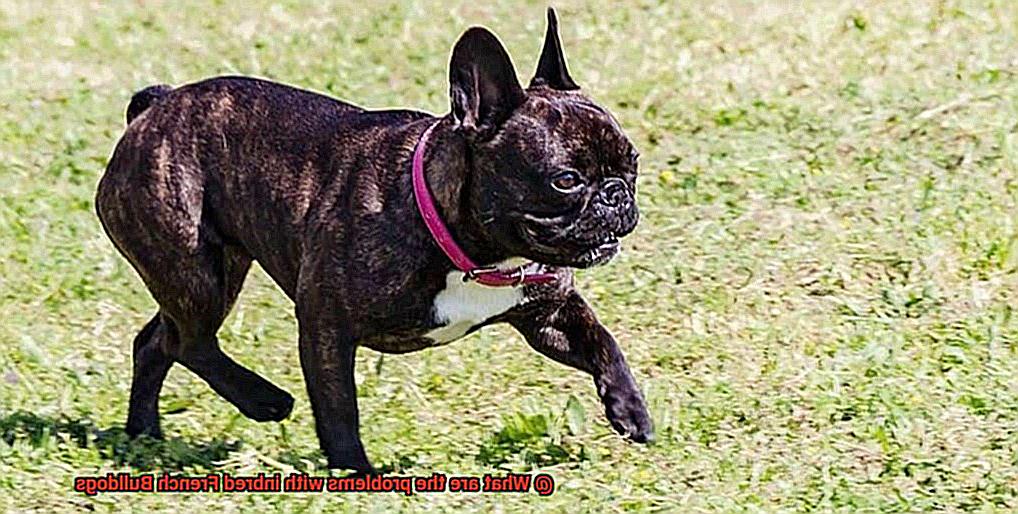
Inbred French Bulldogs may have a weakened immune system, making them more susceptible to allergies. It’s important to be aware that chronic allergies can significantly impact the quality of life for inbred French Bulldogs, causing discomfort, pain, and even secondary infections.
Diagnosis and Treatment Options
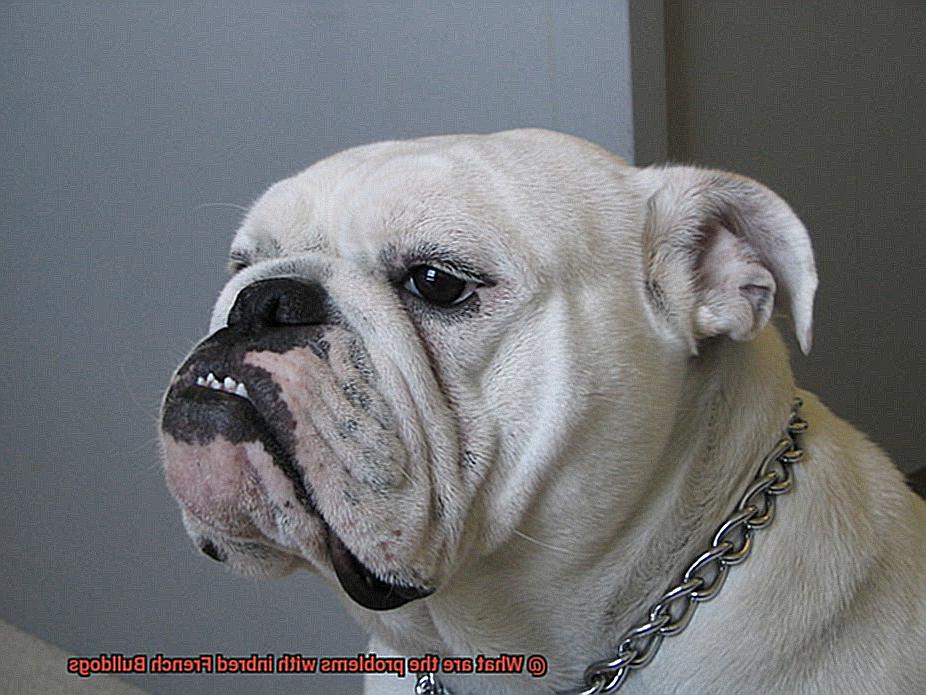
If you suspect your inbred French Bulldog is suffering from allergies, it is crucial to consult with a veterinarian. They will be able to diagnose the specific allergen causing the reaction and recommend appropriate treatment options. Some common treatment options for allergies in French Bulldogs include:
- Medications: Antihistamines or steroids may be prescribed to alleviate the symptoms of allergies. These medications work by reducing inflammation and blocking the release of histamines, which are responsible for allergic reactions.
- Topical Creams or Ointments: Your veterinarian may recommend topical creams or ointments to soothe skin irritations caused by allergies. These products can provide relief from itching and help reduce inflammation.
- Hypoallergenic Diets: In some cases, allergies in French Bulldogs can be triggered by certain foods. Your veterinarian may suggest switching to a hypoallergenic diet that eliminates common allergens, such as grains or certain proteins. This can help identify and eliminate potential food-related allergies.
- Allergen Avoidance Strategies: Minimizing exposure to allergens is crucial for managing allergies in inbred French Bulldogs. This may include using hypoallergenic bedding, avoiding certain cleaning products or chemicals, and keeping your pet away from known triggers like pollen or dust.
In addition to these treatment options, regular grooming and maintaining proper hygiene can also help reduce the risk of allergies in inbred French Bulldogs. Regular bathing, brushing, and keeping their ears clean can prevent the buildup of allergens on their skin and reduce the likelihood of allergic reactions.
Managing Allergies for a Happier Frenchie
While allergies cannot be entirely cured, they can be managed effectively with the right approach and treatment plan. By working closely with your veterinarian and implementing appropriate treatments, you can improve the comfort and well-being of your inbred French Bulldog.
Eye Disorders in Inbred French Bulldogs
French Bulldogs are beloved for their unique appearance and friendly personalities. However, inbred French Bulldogs are more prone to certain health issues, including eye disorders. As a responsible owner, it’s important to understand these conditions and take preventative measures to protect your furry friend’s sight.
In this article, we’ll explore common eye disorders in inbred French Bulldogs and discuss ways to minimize their occurrence.
- Cherry Eye: This condition occurs when the gland in the third eyelid becomes inflamed and protrudes, causing redness, swelling, and discomfort. Surgical intervention is often necessary to correct cherry eye.
- Entropion: In this condition, the eyelid rolls inward towards the eye, leading to irritation and corneal ulcers. Corrective surgery may be required to restore normal eyelid function.
- Cataracts: A clouding of the lens inside the eye, cataracts can impair vision or even cause blindness if left untreated. Surgical removal may be necessary to restore vision.
- Progressive Retinal Atrophy (PRA): PRA causes degeneration of the retina, resulting in progressive vision loss and eventual blindness. Unfortunately, there is no cure for PRA.
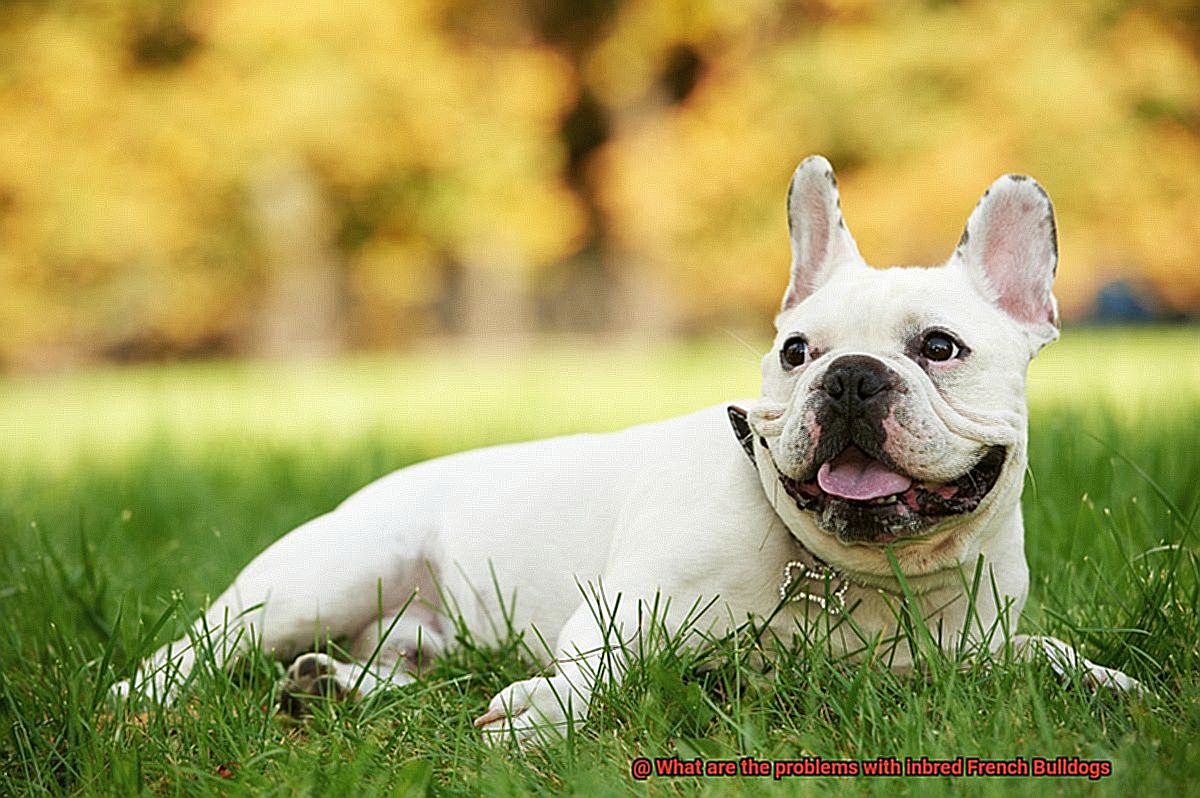

Additionally, inbred French Bulldogs are more susceptible to general eye conditions such as dry eye, glaucoma, and corneal ulcers. Regular veterinary check-ups and proactive management are essential in detecting and treating these conditions early on.
To minimize the occurrence of these eye disorders:
- Opt for responsible breeding practices that prioritize genetic diversity.
- Schedule regular eye examinations with a veterinary ophthalmologist to detect any developing issues early on.
- Prioritize proper eye care by regularly cleaning your Frenchie’s eyes and avoiding exposure to irritants.
- Provide a healthy diet rich in essential nutrients that support eye health.
- Educate yourself about the signs and symptoms of various eye disorders to recognize potential problems and seek prompt veterinary attention.

Musculoskeletal Issues in Inbred French Bulldogs

French Bulldogs are beloved companions known for their affectionate nature and unique appearance. However, inbreeding practices can lead to a range of musculoskeletal issues that affect their overall health and well-being. As an expert in this field, I aim to shed light on the common musculoskeletal problems found in inbred French Bulldogs and their potential consequences.
Hip Dysplasia:
Hip dysplasia is a prevalent musculoskeletal issue observed in inbred French Bulldogs. It occurs when the hip joint fails to develop properly, leading to instability and degeneration. This condition can cause pain, lameness, and difficulty in walking or running.
Patellar Luxation:
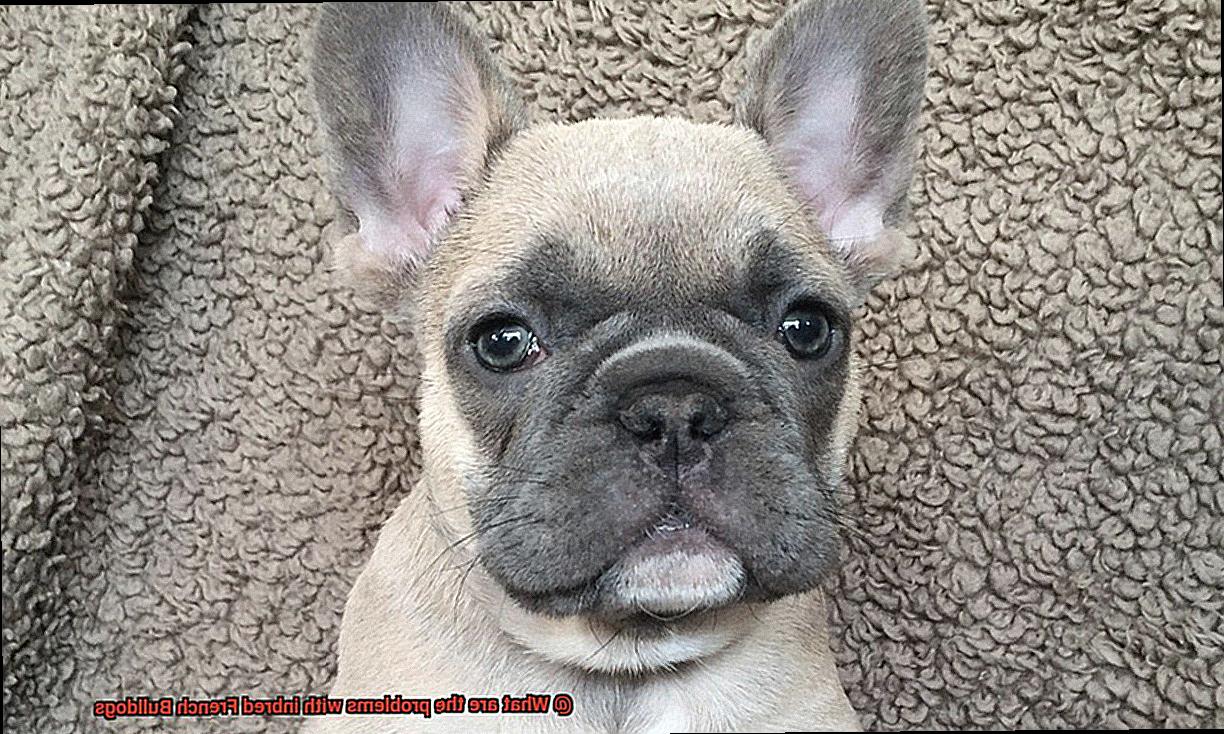
Patellar luxation is another common problem faced by inbred French Bulldogs. It occurs when the kneecap moves out of its normal position, resulting in limping, lameness, and an abnormal gait.
Intervertebral Disc Disease (IVDD):
Inbred French Bulldogs have a higher risk of developing IVDD, a condition where the discs between the vertebrae degenerate or herniate, compressing the spinal cord or nerve roots. Symptoms include pain, weakness, paralysis, and loss of bladder or bowel control.
Elbow Dysplasia:
Elbow dysplasia involves abnormal development of the elbow joint and can lead to joint laxity, inflammation, and osteoarthritis. Inbred French Bulldogs are prone to this condition, causing discomfort and reduced mobility.
Osteochondritis Dissecans (OCD):
OCD is a condition where a piece of cartilage and underlying bone detach from the joint surface. Inbred French Bulldogs may suffer from this painful disorder, resulting in lameness and restricted movement.
Spinal Abnormalities:
Inbred French Bulldogs are also at risk of various spinal abnormalities, ranging from malformed vertebrae to spinal deformities. These issues can cause pain, neurologic deficits, and mobility challenges.
Consequences and Management:
These musculoskeletal issues can significantly impact the quality of life for inbred French Bulldogs. However, early detection, regular veterinary check-ups, appropriate management, and responsible breeding practices can help minimize the consequences. It is essential for owners to prioritize their pet’s well-being by seeking professional advice, providing a balanced diet, and ensuring a diverse breeding approach that prioritizes genetic diversity and health testing.
Skin Conditions and Inbred French Bulldogs
French Bulldogs are beloved companions known for their affectionate nature and unique appearance. However, inbred French Bulldogs may be more prone to developing various skin conditions due to their limited genetic diversity. As responsible owners, it is essential to understand these conditions and implement preventative measures to ensure the optimal health and well-being of our furry friends.
Common Skin Conditions in Inbred French Bulldogs:
Atopic Dermatitis:
- Allergic reaction to environmental allergens
- Symptoms: itching, redness, inflammation, recurrent skin infections
- Prevention and management: Regular veterinary care, allergy testing, hypoallergenic diets, and environmental allergen avoidance.
Pyoderma:
- Bacterial infection of the skin
- Symptoms: redness, pustules, hair loss, unpleasant odors
- Prevention and management: Prompt veterinary attention, proper grooming practices (regular bathing and drying), addressing underlying allergies or hormonal imbalances.
Seborrhea:
- Disorder affecting sebaceous glands resulting in oily or dry/flaky skin.
- Prevention and management: Regular bathing with prescribed shampoos, maintaining a balanced diet with essential fatty acids.
Skin Fold Dermatitis:
- Inflammation and infection in excessive skin folds.
- Symptoms: redness, irritation, foul odor, discharge
- Prevention and management: Regular cleaning of skin folds, keeping them dry, surgical intervention if necessary.
Preventative Measures for Healthy Skin:
Regular Veterinary Check-ups:
- Ensure routine examinations to detect any early signs of skin conditions.
- Seek professional advice on appropriate vaccinations, parasite prevention, and overall skin health.
Proper Grooming Practices:
- Regular bathing with mild shampoos suitable for dogs.
- Brushing and cleaning skin folds to prevent bacterial growth.
- Regular nail trimming and ear cleaning.
Balanced Diet:
- Feed a nutritionally balanced diet with essential fatty acids to support healthy skin.
- Consult with a veterinarian for dietary recommendations or potential allergens to avoid.
Clean and Allergen-Free Environment:
- Regularly clean and vacuum the living area to minimize dust, pollen, and other allergens.
- Avoid exposure to chemicals or irritants that may trigger skin reactions.
How to Minimize the Risk of Health Problems in French Bulldogs
French Bulldogs are adorable and lovable companions, but they are also prone to certain health problems. As responsible pet owners, it’s crucial to take proactive measures to minimize these risks and ensure the well-being of our furry friends. In this guide, we will explore key steps to reduce the chances of health issues in French Bulldogs.
Responsible Breeding Practices:
Choosing a reputable breeder is essential in minimizing health risks. Look for breeders who prioritize the health and genetic diversity of their dogs. Reputable breeders conduct health tests on their breeding stock to identify potential genetic issues and eliminate them from the gene pool. Avoid puppy mills or backyard breeders, as they often prioritize profit over the well-being of the dogs.
Regular Veterinary Care:
Regular check-ups with a trusted veterinarian are crucial for your French Bulldog’s health. Schedule routine examinations to monitor heart health, respiratory function, skin conditions, and eye problems. Establish a good relationship with your vet and seek their guidance on maintaining your French Bulldog’s health.
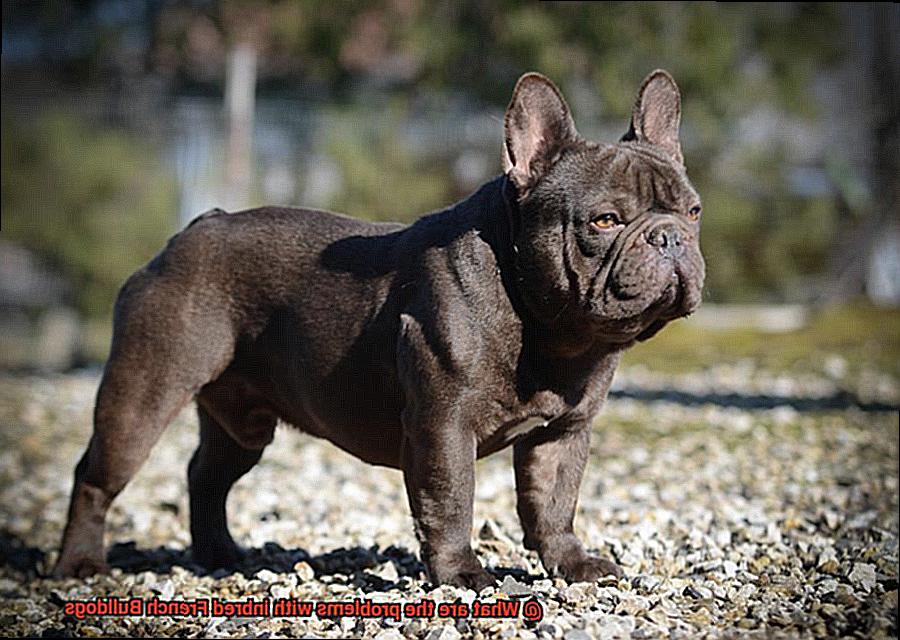
Balanced Diet and Proper Nutrition:
Feeding your French Bulldog a high-quality, balanced diet is essential for their overall health. Consult with your vet to select appropriate dog food based on their age, activity level, and any specific dietary needs or restrictions. Avoid overfeeding and stay away from foods that may be harmful or trigger allergies.
Regular Exercise and Healthy Weight:
Maintaining a healthy weight is vital in minimizing health problems for French Bulldogs. Obesity can worsen existing issues and increase the risk of new ones. Engage in regular exercise routines suitable for the breed’s physical limitations, such as short walks, playtime, and mental stimulation exercises.
Proper Grooming and Hygiene:
Regular grooming practices are important for preventing skin infections and other health issues. Clean facial folds, ears, and trim nails regularly. Dental care is also crucial, as poor oral hygiene can lead to dental disease and other health complications.
Recognizing Early Signs of Health Problems:
Educate yourself about common health issues in French Bulldogs, such as brachycephalic airway syndrome, allergies, skin infections, eye problems, and joint issues. Be vigilant and watch for early signs like difficulty breathing, excessive scratching, redness in the eyes, or limping. Seek prompt veterinary attention if any concerning symptoms arise.
Veterinary Care for Inbred French Bulldogs
When it comes to inbred French Bulldogs, specialized veterinary care is an absolute necessity. These lovable companions are prone to a range of health issues due to their genetic makeup, making regular vet check-ups and tailored medical attention crucial for their well-being.
In this article, we will delve into the significance of veterinary care for inbred French Bulldogs, covering respiratory problems, congenital conditions, vaccinations, dental care, specialized diets, and heatstroke prevention.
Respiratory Issues:

Inbred French Bulldogs often face breathing difficulties due to their shortened snouts and narrow airways. This can lead to mild to severe respiratory problems, especially during physical exertion or in hot weather. Regular visits to the veterinarian are essential for monitoring and managing these issues proactively.
Congenital Conditions:
Apart from respiratory problems, inbred French Bulldogs are more susceptible to various congenital conditions such as heart disease, skin allergies, eye problems, and musculoskeletal disorders like hip dysplasia or patellar luxation. To detect and address these conditions early on, regular veterinary examinations and diagnostic tests are crucial.
Vaccinations:
Vaccines protect inbred French Bulldogs from contagious diseases like parvovirus, distemper, and rabies. A veterinarian will create an appropriate vaccination schedule based on the dog’s age, overall health, and lifestyle.
Dental Care:
The brachycephalic faces of inbred French Bulldogs often result in crowded teeth or misalignments. This can lead to dental problems like gum disease or tooth decay. Regular tooth brushing and professional dental cleanings are necessary to maintain good oral health.
Specialized Diets:
Some inbred French Bulldogs may have dietary sensitivities or intolerances that require special attention. A veterinarian can recommend suitable dog food options or even create a customized diet plan if necessary.
Heatstroke Prevention:
Inbred French Bulldogs find it challenging to regulate their body temperature due to their compromised respiratory systems. It is essential to provide them with a cool and well-ventilated environment, avoid excessive exercise during hot weather, and offer plenty of fresh water to prevent heat-related emergencies.
Responsible Breeding Practices for Healthy French Bulldogs
French Bulldogs are captivating creatures, cherished for their adorable appearance and lovable nature. However, they are also prone to certain health issues due to inbreeding practices. In this article, we will explore the importance of responsible breeding practices for the well-being of French Bulldogs, discussing the impact of inbreeding on their health and highlighting key considerations for prospective owners.
The Dangers of Inbreeding:
Inbreeding can amplify the risk of genetic disorders and inherited diseases within the French Bulldog population. These health issues can range from mild to severe and often require ongoing medical care or even surgery. Some common conditions associated with inbreeding include respiratory problems, skin allergies, eye diseases, hip dysplasia, and heart conditions.
Responsible Breeding Practices:
- Avoiding Inbreeding: Responsible breeders prioritize genetic diversity by avoiding mating closely related individuals. This helps reduce the risk of passing on harmful recessive genes and promotes a healthier gene pool.
- Thorough Health Screenings: Reputable breeders conduct comprehensive health screenings on their breeding dogs to identify any potential genetic diseases. These screenings may include tests for brachycephalic syndrome, degenerative myelopathy, orthopedic issues, and eye disorders. By ensuring the parent dogs are free from known genetic diseases, breeders reduce the likelihood of passing them on to future generations.
- Introducing New Bloodlines: Responsible breeders introduce new bloodlines into their breeding programs to enhance genetic diversity. This practice helps improve overall vitality within the breed and further reduces the risk of inherited disorders.
Choosing a Responsible Breeder:
When searching for a French Bulldog puppy, it is crucial to find a reputable breeder who follows responsible breeding practices. Here are some key considerations:
- Visit the breeder’s facilities to assess the living conditions and meet the parent dogs.
- Inquire about health testing and genetic screenings performed on the breeding dogs.
- Ask about the breeder’s experience and involvement in breed-specific organizations.
- Seek references from previous puppy buyers to gauge their satisfaction with the breeder’s practices.
The Rewards of Responsible Breeding:
By choosing a French Bulldog from a responsible breeder, owners can significantly reduce the risk of encountering the health problems associated with inbreeding. These breeders prioritize the long-term health and vitality of the breed, ensuring that each puppy is raised in a clean, nurturing environment and providing ongoing support and guidance to new owners.
lyiY8Comz8s” >
Conclusion
In conclusion, inbred French Bulldogs face a multitude of problems. These issues arise due to the limited gene pool resulting from extensive inbreeding practices. The consequences of this selective breeding are numerous and often devastating.
One major problem is the high prevalence of genetic disorders among inbred French Bulldogs. These dogs are prone to a range of health conditions, including respiratory problems, skin allergies, eye disorders, and musculoskeletal issues. Their compromised immune systems make them more susceptible to infections and diseases, leading to a shorter lifespan and reduced quality of life.
Furthermore, inbred French Bulldogs often suffer from structural abnormalities that affect their physical well-being. Their short snouts can cause breathing difficulties and overheating, making them particularly vulnerable to heatstroke. Additionally, their compact bodies and disproportionate limbs contribute to joint problems and difficulty with mobility.
Another significant issue is the impact on their behavior and temperament. Inbreeding can result in increased aggression, anxiety, fearfulness, and other behavioral issues. These dogs may exhibit unpredictable or problematic behaviors that can be challenging for owners to manage.
Moreover, the limited genetic diversity caused by inbreeding increases the risk of inherited diseases and reduces the breed’s ability to adapt to changing environmental conditions. This lack of genetic variation also hinders efforts to improve the overall health and well-being of French Bulldogs through responsible breeding practices.
It is crucial for prospective owners to be aware of these problems associated with inbred French Bulldogs before considering bringing one into their homes. Responsible breeders prioritize the health and welfare of their dogs by implementing proper breeding strategies that promote genetic diversity and minimize the risks associated with inbreeding.
In conclusion, while French Bulldogs are undoubtedly adorable companions, it is essential to address the problems associated with inbreeding within this breed.



